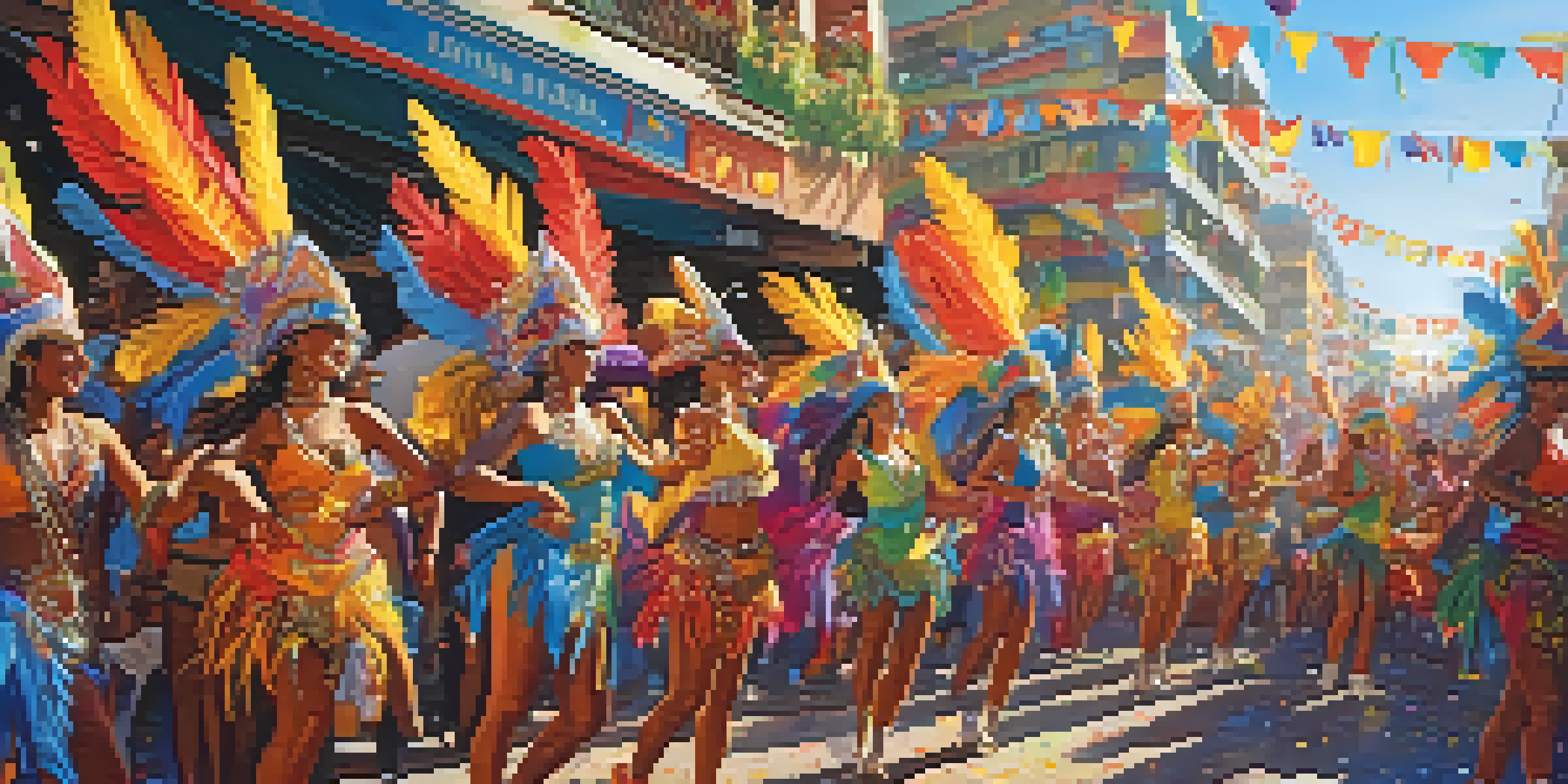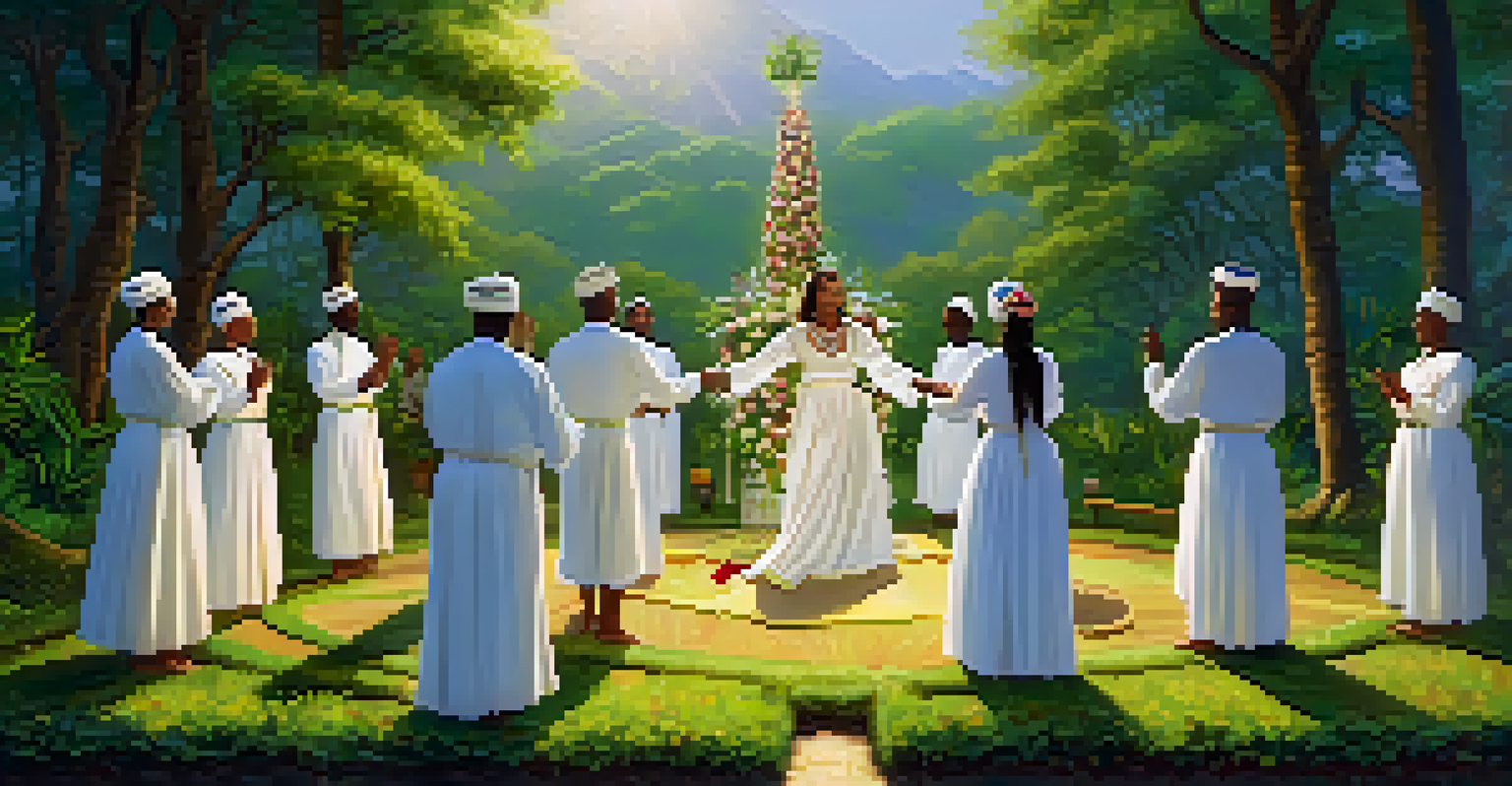The Role of Religion in Brazilian Culture and Identity

The Historical Roots of Religion in Brazil
Brazil's religious landscape is deeply intertwined with its history, beginning with the arrival of Portuguese colonizers who brought Catholicism in the 16th century. This initial influence laid the groundwork for a predominantly Catholic nation, which evolved over centuries. As Brazil opened its doors to various cultures, indigenous beliefs and African religions began to blend with Catholic practices, creating a unique spiritual tapestry.
Religion is a cultural phenomenon that provides individuals with a sense of purpose and community.
The arrival of enslaved Africans introduced Candomblé and other African-derived religions, which were rich in tradition and community. These practices often merged with Catholic rituals, illustrating a remarkable adaptability of faiths in the Brazilian context. This syncretism not only enriched religious practices but also reinforced cultural identity among diverse groups.
Today, Brazil is home to a mix of Catholicism, Protestantism, Candomblé, and Spiritism, reflecting its historical complexities. This diversity showcases the resilience and adaptability of religious practices, which continue to evolve and shape the Brazilian identity as it navigates modernity.
Religion as a Unifying Force in Brazilian Society
In Brazil, religion serves as a powerful unifying force, bringing together individuals from various backgrounds. Community gatherings, festivals, and religious ceremonies often foster a sense of belonging, reinforcing social ties. For example, the vibrant celebrations of Carnival have deep religious roots, blending Catholic traditions with Afro-Brazilian culture, ultimately creating a festive atmosphere that transcends individual differences.

Religious institutions often play a vital role in community support, offering social services, education, and advocacy for marginalized groups. This outreach reflects the commitment of religious communities to promote social justice and improve the lives of those in need. As a result, many Brazilians find not just spiritual guidance but also practical support within their religious institutions.
Brazil's Religious Diversity
Brazil's religious landscape is a rich blend of Catholicism, African, and Indigenous beliefs, reflecting its complex history.
Moreover, the shared experiences and values fostered by religion help bridge cultural divides, making it easier for Brazilians to connect with one another. In a nation marked by diversity, this common ground is invaluable for maintaining harmony and understanding among its people.
The Role of Faith in Brazilian Identity Formation
Religion significantly influences personal and collective identity in Brazil, shaping the values and beliefs of its people. Many Brazilians view their faith as integral to their identity, guiding their moral compass and daily decisions. This connection to spirituality is often visible in the way people engage with their communities and express their cultural heritage.
The blending of different faiths is a demonstration of cultural diversity and a pathway to greater understanding.
For instance, the celebration of religious festivals, such as Festa Junina and Festa do Divino, showcases how faith intertwines with Brazilian culture. These events not only reflect religious devotion but also serve as opportunities for cultural expression, featuring traditional music, dance, and cuisine unique to different regions. Such celebrations highlight the pride Brazilians take in their heritage.
Furthermore, the prominence of religion in Brazilian identity can be seen in the prevalence of religious symbols and practices in everyday life. From the simple act of crossing oneself before a meal to elaborate religious art, these expressions serve as constant reminders of faith's role in shaping both individual and national identity.
Syncretism: A Unique Brazilian Religious Phenomenon
One of the most fascinating aspects of religion in Brazil is the phenomenon of syncretism, where different religious traditions blend together. This is particularly evident in the fusion of African, Indigenous, and Catholic beliefs, resulting in unique practices that distinguish Brazilian spirituality. For example, many Candomblé practitioners might also celebrate Catholic saints, illustrating a seamless integration of faiths.
This syncretism is not only a testament to Brazil's cultural diversity but also reflects a broader philosophy of acceptance and coexistence. The blending of beliefs allows individuals to navigate their spiritual lives more freely, often leading to a more inclusive understanding of faith. This openness is particularly striking in a world where rigid religious boundaries often create divisions.
Religion Unites Brazilian Communities
Religion serves as a powerful unifying force in Brazil, fostering community ties through shared celebrations and support systems.
Moreover, syncretism enriches Brazil's cultural expressions, from music and dance to visual arts. The rhythmic beats of samba, for instance, often draw from religious themes, creating a vibrant celebration of life that resonates with many Brazilians, irrespective of their individual faiths.
Religion and Social Movements in Brazil
Religion in Brazil has played a significant role in various social movements throughout history, often serving as a catalyst for change. From the abolition of slavery to contemporary movements advocating for LGBTQ+ rights, religious groups have mobilized communities to fight for social justice. For instance, many churches have become safe havens for marginalized groups, fostering dialogue and activism.
These religiously motivated movements often draw upon the teachings of compassion and equality found in various faiths. By framing social issues within a moral context, religious leaders can inspire action and foster solidarity among diverse communities. This intersection of faith and activism highlights the potential for religion to inspire positive change.
Furthermore, the growing Protestant evangelical movement in Brazil has significantly influenced social perspectives, particularly regarding issues of poverty and education. Evangelical churches frequently engage in community service and development projects, showcasing how faith can empower individuals and lift communities out of challenging circumstances.
The Influence of Religion on Brazilian Arts and Culture
Religion has profoundly impacted Brazilian arts and culture, inspiring countless works across various mediums. From music genres like samba and bossa nova to traditional crafts, religious themes often permeate artistic expressions. For example, many songs celebrate saints or recount biblical stories, reflecting the spiritual essence of Brazilian life.
Visual arts in Brazil also showcase the influence of religion, with numerous artists drawing inspiration from religious iconography and themes. The vibrant colors and intricate designs found in religious festivals often translate into artistic expressions that celebrate both faith and culture. This intersection of art and spirituality creates a rich tapestry that embodies Brazil's diverse heritage.
Art Reflects Religious Influence
Brazilian arts and culture are deeply influenced by religious themes, with music, visual arts, and literature often exploring spirituality.
Additionally, the fusion of religious and cultural elements is evident in Brazilian cinema and literature, where narratives often explore themes of faith, identity, and social justice. These artistic explorations not only entertain but also provoke thought and discussion, inviting audiences to reflect on the role of religion in their lives and society as a whole.
Challenges Facing Religion in Modern Brazil
As Brazil continues to evolve, the role of religion faces various challenges that impact its influence on culture and identity. Secularization trends, driven by modernization and globalization, have led to a decline in traditional religious participation among younger generations. This shift raises questions about the future of religious practices and their relevance in an increasingly diverse society.
Moreover, the rise of new religious movements and alternative spiritual practices presents both opportunities and challenges for established faiths. Some traditional religious groups may feel threatened by the growing popularity of these movements, leading to tensions within the spiritual landscape. This dynamic underscores the need for interfaith dialogue and understanding in a pluralistic society.

Despite these challenges, religion remains a vital aspect of Brazilian culture and identity. Many individuals continue to seek solace and community within their faith, demonstrating the enduring power of spirituality in navigating life's complexities, even in a rapidly changing world.